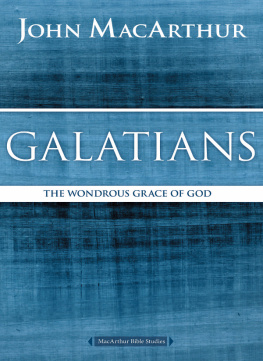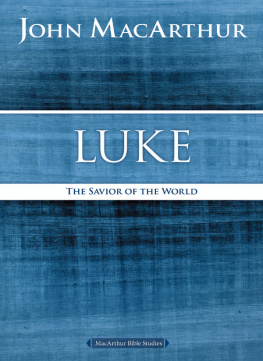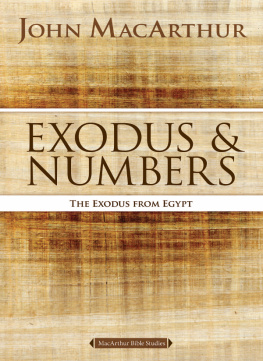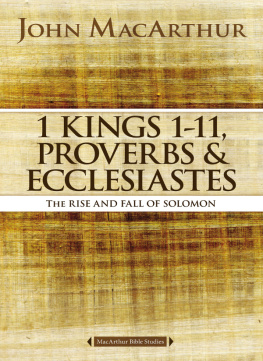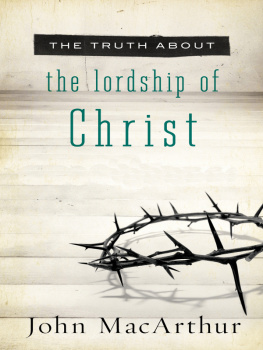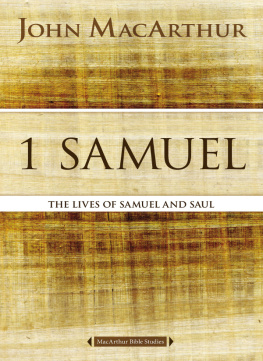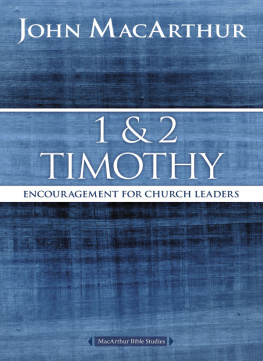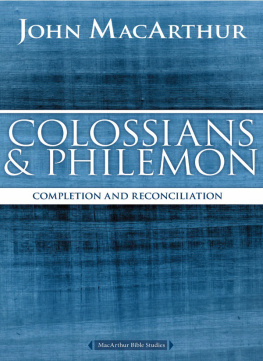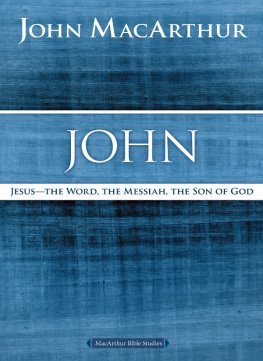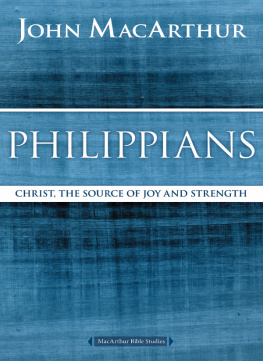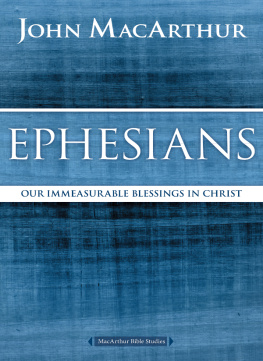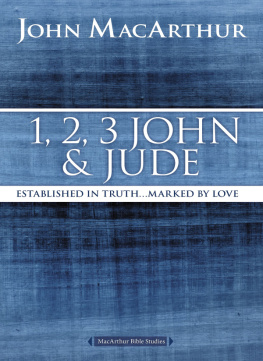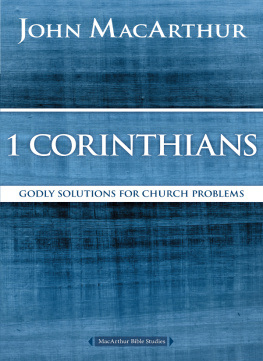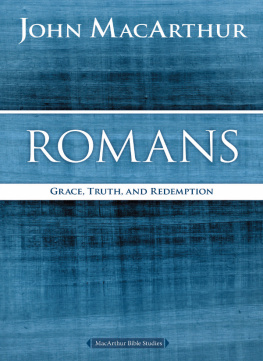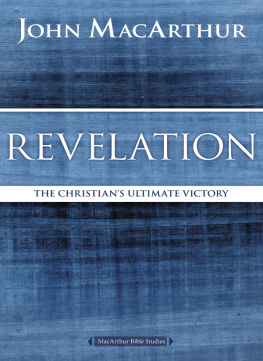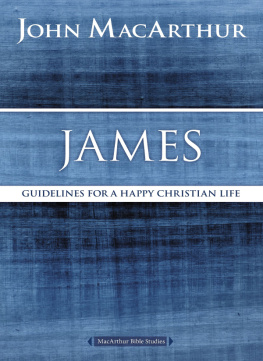GALATIANS
MACARTHUR BIBLE STUDIES
2007, John F. MacArthur, Jr.
All rights reserved. No portion of this book may be reproduced, stored in a retrieval system, or transmitted in any form or by any meanselectronic, mechanical, photocopy, recording, or any otherexcept for brief quotations in printed reviews, without the prior permission of the publisher.
Published in Nashville, Tennessee, by Nelson Books, an imprint of Thomas Nelson. Nelson Books and Thomas Nelson are registered trademarks of HarperCollins Christian Publishing, Inc.
Nelson Books titles may be purchased in bulk for education, business, fundraising, or sales promotional use. For information, please email SpecialMarkets@ThomasNelson.com
Published in association with the literary agency of Wolgemuth & Associates, Inc.
Produced with the assistance of the Livingstone Corporation. Project staff include Jake Barton, Betsy Todt Schmitt, and Andy Culbertson. Project editors: Mary Horner Collins, Amber Rae, and Len Woods
Scripture quotations marked NKJV are taken from the The New King James Version.
1982 by Thomas Nelson, Inc. Used by permission. All rights reserved.
Unleashing Gods Truth, One Verse at a Time is a trademark of Grace to You. All rights reserved.
Truth for Today material is from Galatians: MacArthur New Testament Commentary (Moody Press: Chicago, IL, 1995) and from The Glory of Heaven by John MacArthur (Crossway Books: Wheaton, IL, 1996).
Keys to the Text material taken from the following sources:
Galatians: MacArthur New Testament Commentary (Moody Press: Chicago, IL, 1995). Used by permission. All rights reserved.
The MacArthur Study Bible (electronic ed.). John MacArthur, General Editor. 1997 by Word Publishing. All rights reserved. Used by permission.
Nelsons New Illustrated Bible Dictionary, Rev. ed. R. F. Youngblood, F. F. Bruce, R. K. Harrison, editors. 1995 by Thomas Nelson Publishers. Used by permission.
Romans: MacArthur New Testament Commentary Series (Moody Press: Chicago, IL, 1994). Used by permission.
Truth for Today: A Daily Touch of Gods Grace by John MacArthur (J. Countryman: Nashville, TN, 2001).
Cover Art by Holly Sharp Design
Interior Design and Composition by Joel Bartlett, Livingstone Corporation
ISBN: 978-0-7180-3509-9
ISBN: 978-0-7180-3528-0 (eBook)
15 16 17 18 19 RRD 6 5 4 3 2 1
CONTENTS
Departing from the Gospel
Galatians 1:19
Defending the Gospel
Galatians 1:102:10
Crucified with Christ
Galatians 2:1121
Justification by Faith
Galatians 3:19
The Law and the Promise
Galatians 3:1018
The Purpose of the Law
Galatians 3:1929
Children of God
Galatians 4:111
Christ in You
Galatians 4:1220
Children of Promise
Galatians 4:215:1
Called to Freedom
Galatians 5:215
Walking in the Spirit
Galatians 5:1626
A Grace-Filled Life
Galatians 6:118
Galatians derives its title (pros Galatas) from the region in Asia Minor (modern Turkey) where the churches addressed were located. This is Pauls only epistle specifically addressed to churches in more than one city (1:2; see 3:1; 1 Cor. 16:1).
AUTHOR AND DATE
There is no reason to question the internal claims that the apostle Paul wrote Galatians (1:1; 5:2). Paul was born in Tarsus, a city in the province of Cilicia, not far from Galatia. Under the famous rabbi Gamaliel, Paul received a thorough training in the Old Testament Scriptures and in the rabbinic traditions at Jerusalem (Acts 22:3). A member of the ultra-orthodox sect of the Pharisees (Acts 23:6), he was one of first-century Judaisms rising stars (1:14; see Phil. 3:56).
The course of Pauls life took a sudden and startling turn when, on his way to Damascus from Jerusalem to persecute Christians, he was confronted by the risen, glorified Christ (see Acts 9). That dramatic encounter turned Paul from Christianitys chief persecutor to its greatest missionary. His three missionary journeys and his trip to Rome turned Christianity from a faith that included only a small group of Palestinian Jewish believers into an empire-wide phenomenon. Galatians is one of thirteen inspired letters that Paul addressed to Gentile congregations or his fellow workers.
Chapter 2 describes Pauls visit to the Jerusalem Council of Acts 15 (see 2:1), so he must have written Galatians after that event. Since most scholars date the Jerusalem Council at about AD 49, the most likely date for Galatians is shortly thereafter.
BACKGROUND AND SETTING
In Pauls day, the word Galatia had two distinct meanings. In a strict ethnic sense, Galatia was the region of central Asia Minor inhabited by the Galatians. They were a Celtic people who had migrated to that region from Gaul (modern France) in the third century BC The Romans conquered the Galatians in 189 BC but allowed them to have some measure of independence until 25 BC, when Galatia became a Roman province, incorporating some regions not inhabited by ethnic Galatians (for example, parts of Lycaonia, Phrygia, and Pisidia). In a political sense, Galatia came to describe the entire Roman province, not merely the region inhabited by the ethnic Galatians.
Paul founded churches in the southern Galatian cities of Antioch, Iconium, Lystra, and Derbe (Acts 13:1414:23). These cities, although within the Roman province of Galatia, were not in the ethnic Galatian region. There is no record of Pauls founding churches in that northern, less populated region.
Those two uses of the word Galatia make it more difficult to determine who the original recipients of the epistle were. Some interpret Galatia in its strict racial sense and argue that Paul addressed this epistle to churches in the northern Galatian region, inhabited by the ethnic descendants of the Gauls. Although the apostle apparently crossed the border into the fringes of ethnic Galatia on at least two occasions (Acts 16:6; 18:23), Acts does not record that he founded any churches or engaged in any evangelistic ministry there.
Because neither Acts nor Galatians mentions any cities or people from northern (ethnic) Galatia, it is reasonable to believe that Paul addressed this epistle to churches located in the southern part of the Roman province, but outside of the ethnic Galatian region. Acts records the apostles founding of such churches at Pisidian Antioch (Acts 13:1450), Iconium (Acts 13:5114:7; see 16:2), Lystra (Acts 14:819; see 16:2), and Derbe (Acts 14:2021; see 16:1). In addition, the churches Paul addressed had apparently been established before the Jerusalem Council (Gal. 2:5), and the churches of southern Galatia fit that criterion, having been founded during Pauls first missionary journey before the Council met. Paul did not visit northern (ethnic) Galatia until after the Jerusalem Council (Acts 16:6).
Paul wrote Galatians to counter Judaizing false teachers who were undermining the central New Testament doctrine of justification by faith (see Rom. 3:24). Ignoring the express decree of the Jerusalem Council (Acts 15:2329), they were spreading a dangerous teaching that Gentiles must first become Jewish proselytes and submit to all the Mosaic Law before they could become Christians (Gal. 1:7; 4:17, 21; 5:212; 6:1213). Shocked by the Galatians openness to that damning heresy (1:6), Paul wrote this letter to defend justification by faith and warn these churches of the dire consequences of abandoning that essential doctrine. Galatians is Pauls only epistle that does not contain a commendation of its readers. This obvious omission reflects how urgently he felt about confronting the defection and defending the essential doctrine of justification.
HISTORICAL AND THEOLOGICAL THEMES
Next page
